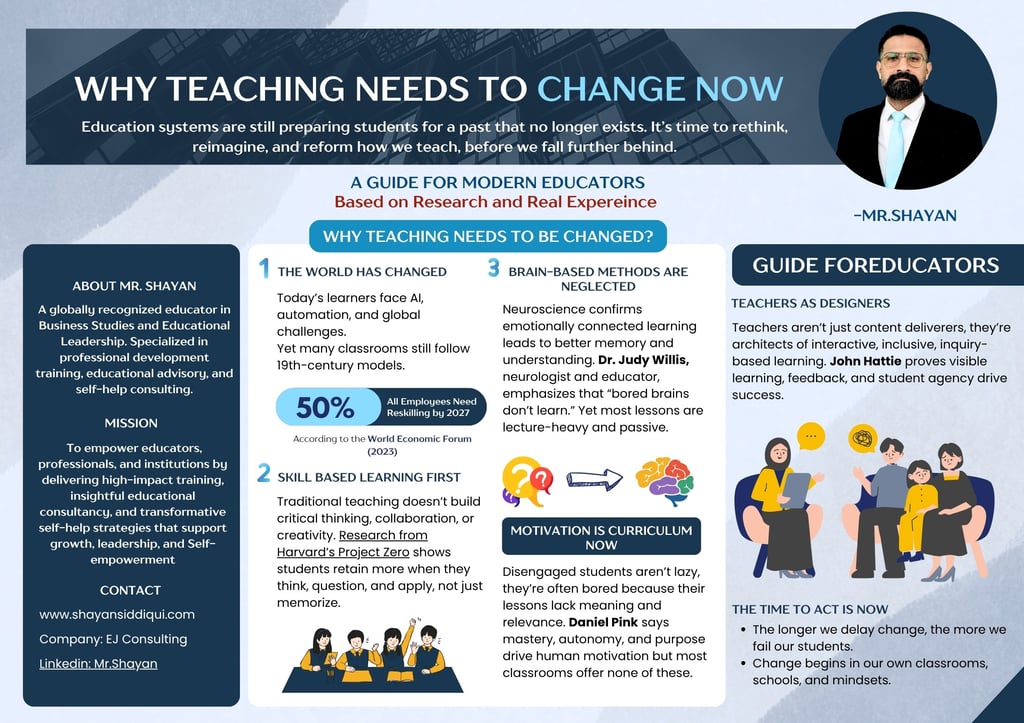
Why We Must Evolve Teaching Today for Tomorrow’s Learners
In this article we have briefly discussed why urgent change in teaching is essential for educators. With valid references we explore how to close the skills gap, adapt to AI, support student wellbeing, and lead meaningful classroom transformation.
Mr. Shayan Siddiqui
8/11/20252 min read


In 2023, UNESCO reported that over 244 million children and youth worldwide were still out of school, while millions more were in classrooms yet disengaged from learning. The problem is no longer just access it’s relevance. Walk into many schools today, and you’ll still see teaching models shaped for an industrial-age society. Meanwhile, the world outside those classroom walls is being transformed by artificial intelligence, shifting job markets, and complex global challenges.
For IB and Cambridge educators, the disconnect between curriculum aims and real-world demands is becoming harder to ignore. The question isn’t if teaching should change, how quickly we can adapt before we lose another generation of learners to outdated methods.
Reason 1: The Skills Gap Is Widening
Employers consistently report that graduates lack skills such as critical thinking, collaboration, and adaptability skills embedded in the IB Learner Profile and the Cambridge learner attributes, but not always realized in practice. A World Economic Forum report predicts that by 2027, nearly half of all workplace tasks will be automated or augmented by technology. If classroom instruction remains heavily content-focused, we risk preparing students for a world that no longer exists.
What You Can Do Now?
Shift lesson planning from “What content will I cover?” to “What thinking, skills, and dispositions will students build today that they can use tomorrow?”
Reason 2: The Rise of AI Demands a New Pedagogical Lens
Generative AI is not coming it’s here, shaping how students access and process information. Traditional assessments that reward memorization are quickly losing credibility. IB’s emphasis on inquiry-based learning and Cambridge’s focus on higher-order thinking are not just philosophical stances they are survival strategies in the AI era.
What You Can Do Now?
Design assessments that measure synthesis, application, and creativity. Ask questions AI cannot answer without genuine human judgment, empathy, or original thought.
Reason 3: Student Wellbeing Is Now a Core Learning Priority
A 2022 OECD study found that student anxiety levels have increased significantly since the pandemic. Academic achievement without emotional resilience is a short-term win with long-term consequences. Both IB and Cambridge frameworks provide room for socio-emotional learning, but it requires intentional integration, not token lessons.
What You Can Do Now?
Incorporate wellbeing checks into regular lessons. Build reflective activities that help students connect personal growth with academic progress.
Reason 4: Leadership Must Drive, Not Follow, Change
Systemic change in teaching is impossible without courageous leadership. Too often, school leaders wait for curriculum updates before initiating shifts in teaching practice. Yet, the most impactful IB and Cambridge schools treat innovation as a cultural value, not a compliance task.
What You Can Do Now?
Leaders should create safe spaces for experimentation in pedagogy. Pilot new teaching models in small teams, gather feedback, and scale what works.
Looking Ahead
We are teaching in a time when the half-life of knowledge is shrinking, but the half-life of values, empathy, and adaptability is enduring. Changing how we teach is not about keeping up with trends; it’s about staying faithful to the deeper mission of education preparing young people to thrive in uncertainty and contribute meaningfully to the world.
The choice is yours: adapt now, or risk becoming irrelevant in the eyes of the very learners we aim to inspire.
The question every educator should be asking is, if my students graduated tomorrow, would my teaching have prepared them for the world they will face, not the one I grew up in?